When you think of Samoyeds, friendly and cheerful images likely come to mind. However, their charming appearance can mask a more complex reality. You might be surprised to learn that stubbornness, high energy levels, and socialization challenges often complicate their behavior. Understanding these factors is vital for anyone considering adding a Samoyed to their life. Before you make any decisions, it’s important to explore the nuances that might change your perspective.
They Can Be Stubborn

While many dog breeds are known for their enthusiastic-to-please demeanor, Samoyeds often showcase a different side—one that reveals their stubborn nature.
This stubborn behavior can lead to significant training challenges, as they might resist commands or training techniques that don’t align with their preferences.
Understanding this trait is essential for tailored training approaches to effectively connect with your Samoyed and foster better cooperation.
High Energy Levels
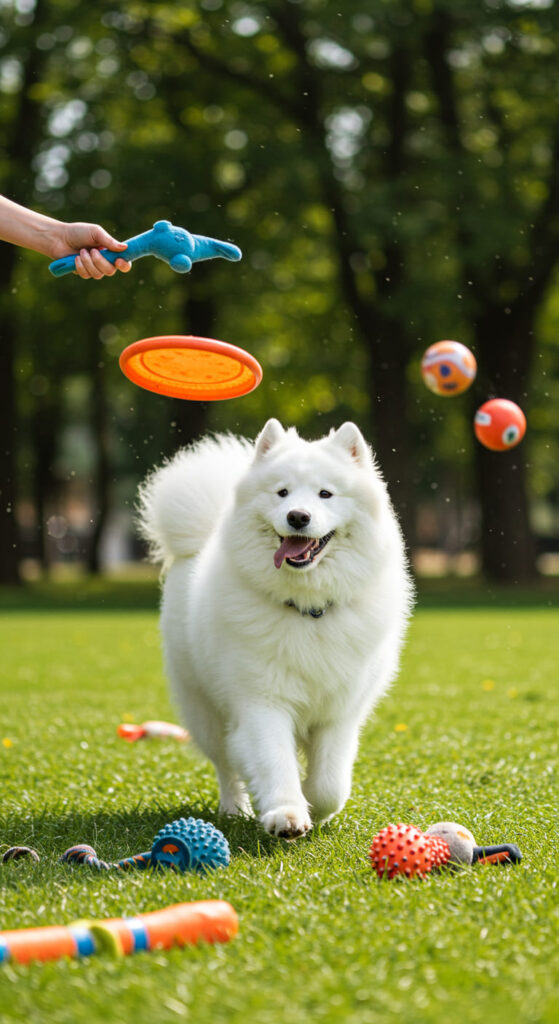
Samoyeds are bundles of energy, often requiring ample exercise and mental stimulation to keep them happy and balanced.
Their high energy levels mean they thrive on regular, engaging activities. Without adequate playtime, you may witness increased restlessness or behavioral issues.
Understanding their playtime needs is vital for ensuring a harmonious relationship and overall well-being, challenging the perception of their friendliness.
Independent Nature
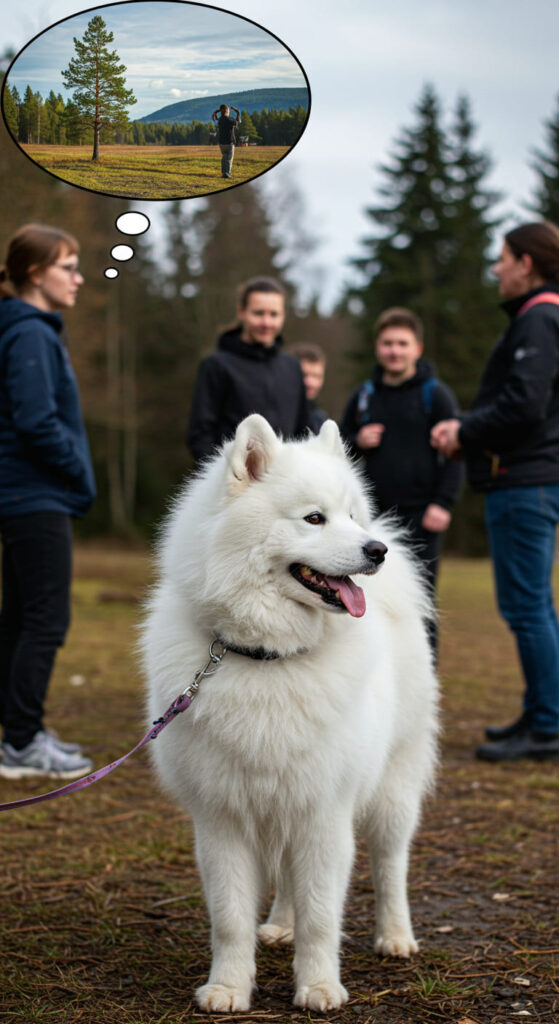
Though many people view Samoyeds as friendly and social companions, their independent nature can be quite surprising.
You’ll notice their self-sufficient instincts often take precedence, allowing them to thrive without constant human interaction.
Balancing independence with socialization is essential for a well-rounded experience. Understanding this aspect of their behavior can help you manage expectations regarding their companionship and social demeanor.
Prone to Separation Anxiety

Many owners may not expect that beneath the surface of a Samoyed’s independent spirit lies a tendency toward separation anxiety.
This condition can lead to destructive behavior, such as chewing furniture or excessive barking when left alone.
Understanding this aspect of their personality is vital for responsible ownership, as it highlights the need for gradual training and appropriate coping mechanisms to ease their anxiety.
Socialization Challenges
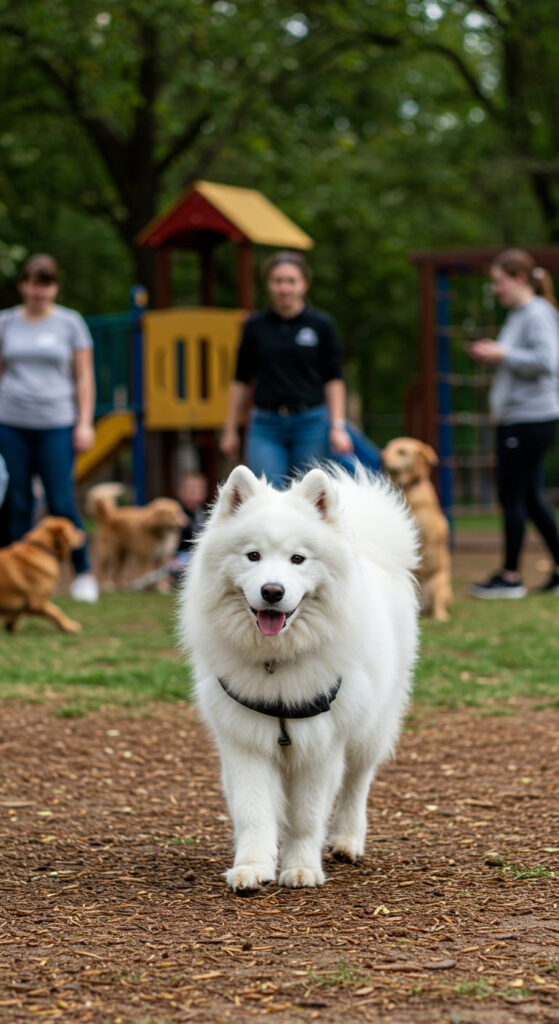
While the playful nature of Samoyeds may suggest they thrive in social settings, they can actually struggle with socialization.
You might find that without proper socialization methods and early exposure to diverse environments, these dogs can become wary or overly excited around unfamiliar people and animals.
Understanding these challenges can help you prepare for effective training and improve their sociability over time.
Strong Prey Drive
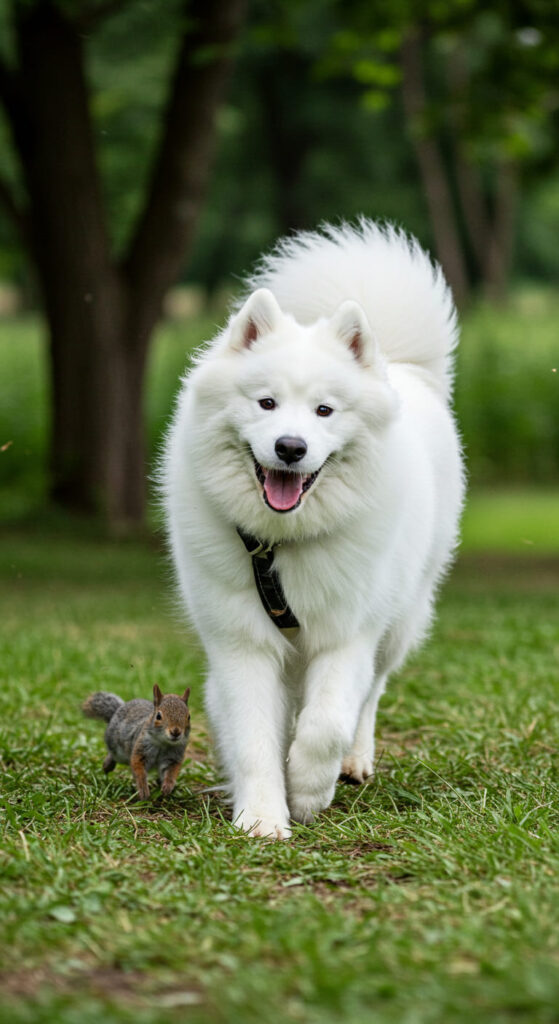
Samoyeds may face socialization challenges, but another noticeable aspect of their behavior is their strong prey drive.
This breed exhibits strong prey instincts rooted in their historical hunting tendencies.
You’ll likely observe them chasing small animals or engaging in spirited play that mimics hunting.
Recognizing and understanding these instincts is essential for managing their behavior effectively, ensuring they don’t become overly fixated on potential prey.
Need for Consistent Training
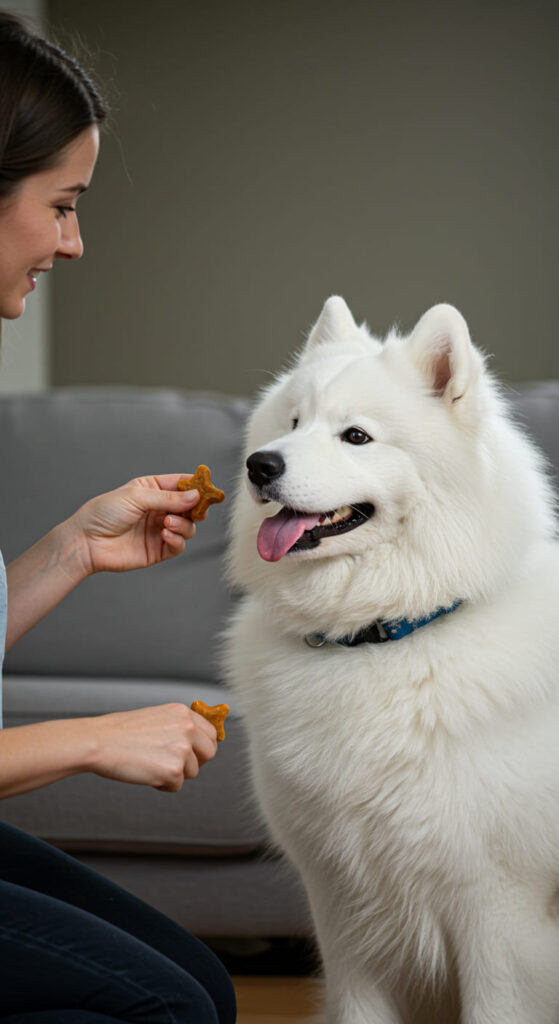
To guarantee a well-adjusted and well-behaved Samoyed, consistent training is essential. Utilizing positive reinforcement, you reinforce desirable behaviors while minimizing unwanted actions.
Without training consistency, your Samoyed may become confused, leading to problematic behaviors. Regular practice not only strengthens your bond but also builds trust, making your Samoyed more responsive and obedient.
Prioritize consistency to achieve the best training outcomes.
Vocalization Issues

A well-trained Samoyed often showcases a range of vocalizations, which can include barks, howls, and other expressive sounds.
Understanding these vocalization types is essential for managing their behavior. Inconsistent training methods may lead to excessive barking or inappropriate sounds, which can be disruptive.
Effective training helps you channel their vocalizations positively, ensuring a harmonious relationship between you and your Samoyed.
Can Be Aloof With Strangers

While you might expect Samoyeds to be as friendly with strangers as they’re with their families, their behavior can often reveal a more reserved side.
Their aloof demeanor may create an impression of stranger anxiety, making them hesitant around unfamiliar faces. This behavior isn’t a sign of aggression but rather a protective instinct, prompting careful observation before engagement with new individuals.
Grooming Requirements Stress

Given their thick, double coats, Samoyeds require extensive grooming, which can be a source of stress for both the dog and its owner.
A consistent grooming schedule is essential for coat maintenance, especially during shedding seasons.
You’ll need various grooming tools and effective grooming techniques to manage their fur, which can add to grooming costs and time commitment—factors that might overwhelm some owners.
Possible Aggression Towards Other Animals
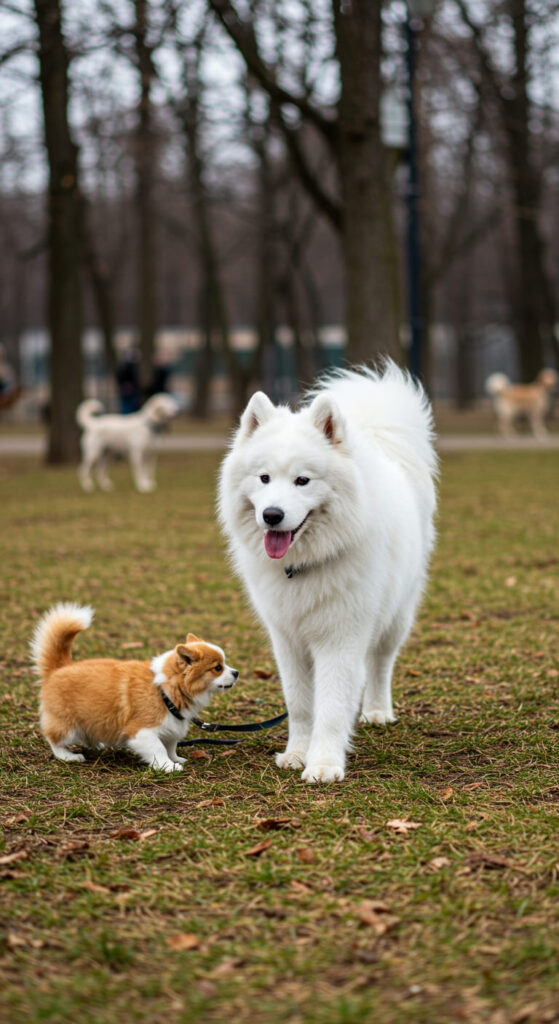
Despite their charming appearance and playful demeanor, Samoyeds can exhibit possible aggression towards other animals, which might surprise prospective owners.
Their territorial behavior often manifests during animal interactions, leading to potential conflicts with unfamiliar pets.
It’s essential to observe their reactions in diverse situations and provide socialization opportunities, ensuring that their innate instincts don’t overwhelm their friendly disposition towards others.
Not Always Great With Small Children
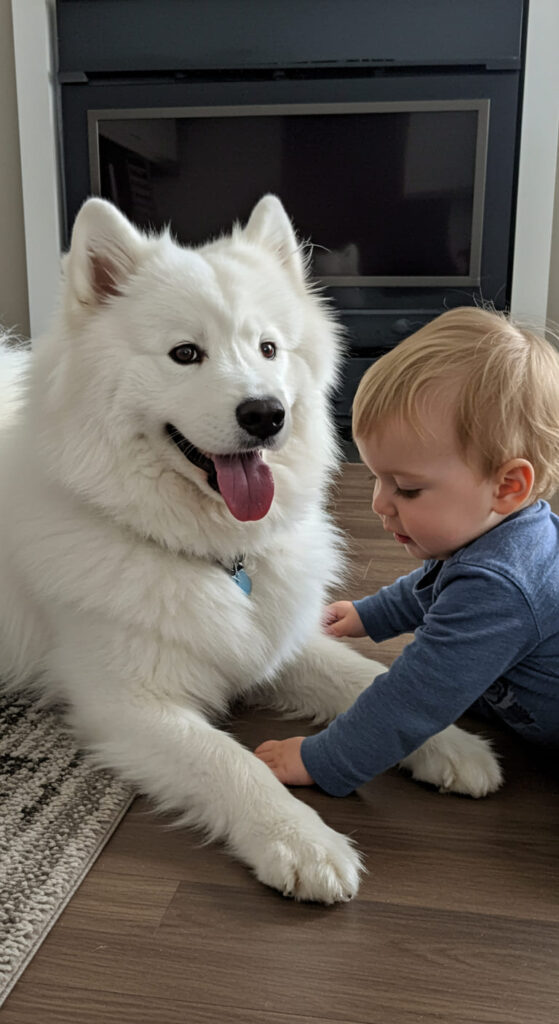
Although Samoyeds are known for their playful nature, they aren’t always the best fit for households with small children.
Samoyed temperament concerns often arise in interactions with kids, as their exuberance can unintentionally overwhelm or intimidate young ones.
Understanding child interaction dynamics is essential; a gentle approach is necessary to guarantee both your child and your Samoyed coexist safely and harmoniously in the home.
Sensitivity to Temperature Changes
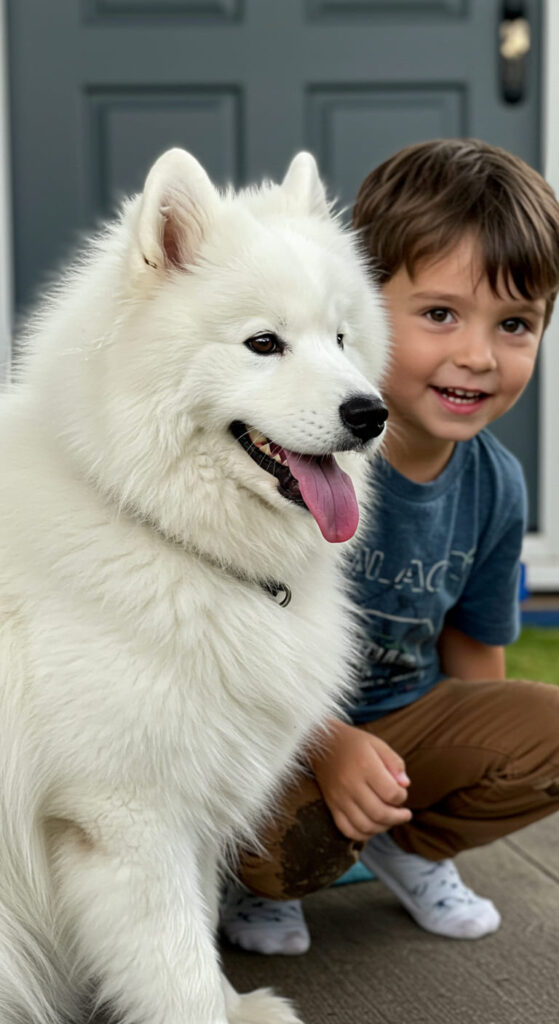
When you consider bringing a Samoyed into your home, it’s important to recognize their sensitivity to temperature changes.
These dogs thrive in cold climates, demonstrating a lack of climate adaptability to heat. This temperature sensitivity can affect their behavior and overall well-being, necessitating careful management during warmer months.
Ensuring they stay cool and comfortable will help maintain their temperament and health.
Health Issues Affecting Behavior

While many people perceive Samoyeds as friendly, underlying health issues can greatly impact their behavior. Conditions like hip dysplasia or allergies can lead to pain, causing irritability and withdrawal.
Regular health monitoring helps identify these problems early. Additionally, behavioral therapy might be necessary to address any anxiety or aggression stemming from physical discomfort, ensuring a more balanced temperament in your Samoyed.
Misinterpretation of Their Playfulness
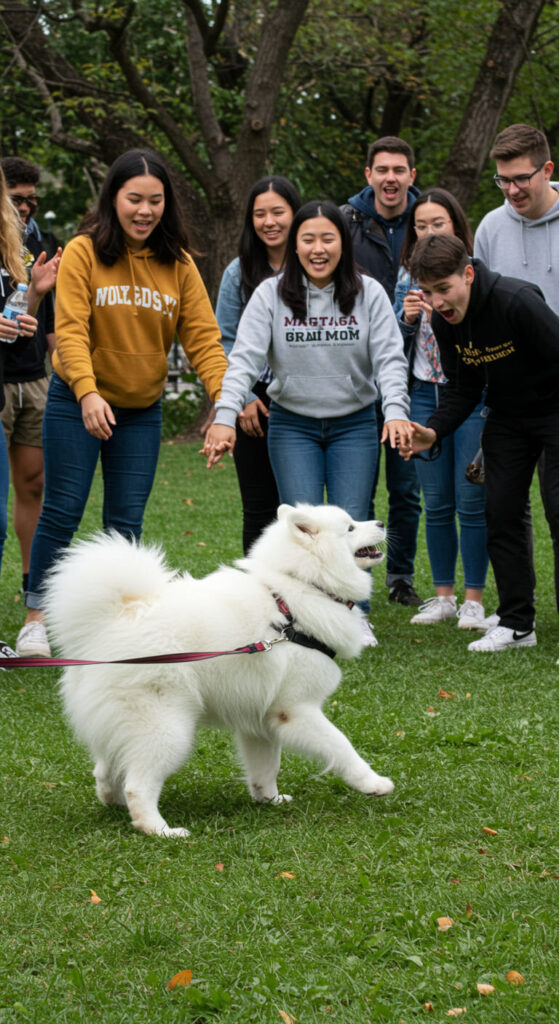
Many owners mistake a Samoyed’s playfulness for unwavering friendliness, but this can lead to misunderstandings about their true nature.
The playful misconceptions surrounding these dogs overshadow their behavioral nuances. While they may exhibit exuberance during interactions, it doesn’t always translate to sociability or trust in every scenario.
Recognizing this distinction is essential for fostering a deeper understanding of their individual temperament.